Victims of Disappearances – Still Waiting for Justice in
Sri Lanka
by M.C.M. Iqbal
Note: This is an edited version of a presentation made by the writer at
a panel discussion organized by the International Commission of Jurists
at the UN in Geneva on 18 March 2010, on the occasion of the launching
of the book “Rule of Law, The Criminal Justice System and Commissions of
Inquiry since 1977” written by Kishali Pinto Jayawardena.
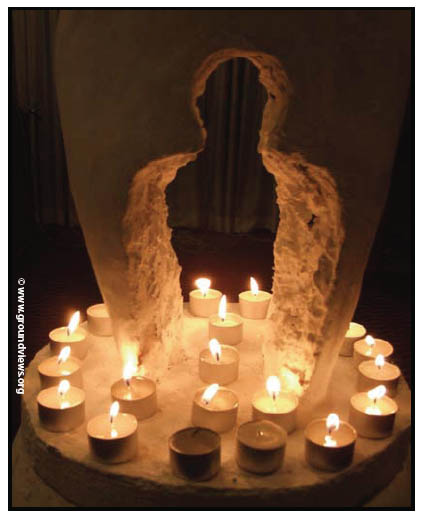 Several
Commissions of Inquiry into Disappearances of Persons (COIs) had been
appointed by successive governments since 1990. Of these, the writer had
been the Secretary to what is known as the Central Zone Commission1 and
the All Island Commission appointed in 1994 and 1998, respectively.
Militancy of Sinhala youth in the South and the Tamil youth in the North
resulted in what the NGOs estimate to be the disappearance of nearly
60,000 youth from various parts of Sri Lanka. However, the Commissions
appointed in 1994 received only 27,526 complaints. Of these 10,136
complaints were inquired into by the All Island Commission appointed in
1998. The following comments and observations are made as a corollary to
the book that is being launched today. It is hoped that the readers
would get a clearer picture of the task of the COIs and what followed
after their reports were submitted to the President.
Several
Commissions of Inquiry into Disappearances of Persons (COIs) had been
appointed by successive governments since 1990. Of these, the writer had
been the Secretary to what is known as the Central Zone Commission1 and
the All Island Commission appointed in 1994 and 1998, respectively.
Militancy of Sinhala youth in the South and the Tamil youth in the North
resulted in what the NGOs estimate to be the disappearance of nearly
60,000 youth from various parts of Sri Lanka. However, the Commissions
appointed in 1994 received only 27,526 complaints. Of these 10,136
complaints were inquired into by the All Island Commission appointed in
1998. The following comments and observations are made as a corollary to
the book that is being launched today. It is hoped that the readers
would get a clearer picture of the task of the COIs and what followed
after their reports were submitted to the President.
The Mandates of these Commissions
It needs to be noted that the Mandates of the three Zonal Commissions
authorized the COIs to inquire only into incidents of disappearances
that occurred after 1 January 1988. This resulted in a large number of
disappearances that occurred during the period before that date being
excluded from being inquired into by these COIs.
At the time the COIs were appointed. Jaffna was under the control of the
LTTE and the people of that area had no electricity or access to
information. They were not able to travel freely to the South. So many
of the victims of disappearances in the North at that time did not even
know there was a COI appointed to inquire into such incidents.
Consequently, the North East Zonal COI, which incidentally never had a
sitting in Jaffna, received very few complaints from the Jaffna
District.
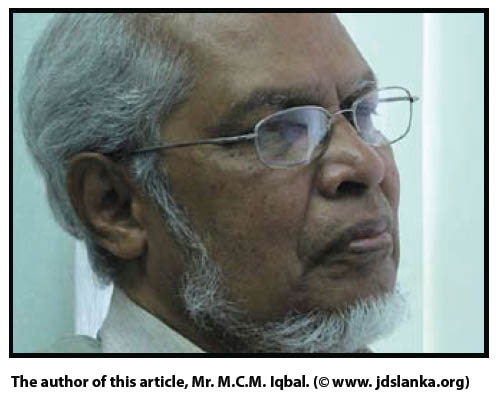 In
the conduct of their inquiries, the COIs are exempted from the
requirement to comply with the provisions of the Evidence Ordinance so
they were able to come to a finding on a balance of probabilities based
on the evidence of complainant and other witnesses, and on an
examination of the relevant information, books and records at the police
stations. The COIs had to, inter alia, come to a finding on whether
credible material indicative of the person or persons responsible, was
available.
In
the conduct of their inquiries, the COIs are exempted from the
requirement to comply with the provisions of the Evidence Ordinance so
they were able to come to a finding on a balance of probabilities based
on the evidence of complainant and other witnesses, and on an
examination of the relevant information, books and records at the police
stations. The COIs had to, inter alia, come to a finding on whether
credible material indicative of the person or persons responsible, was
available.
The COIs were also expected to report on the whereabouts of the persons
alleged to have disappeared. This could not be done satisfactorily as
they had no access to the several unauthorized detention centers about
which the COIs became aware during course of the inquiries.
When the COIs had concluded their inquiries and were in the process of
writing their reports, the Secretary to the President summoned the
Chairpersons and Secretaries of the COIs and informed them that any
compensation contemplated should not be a burden to the finances of the
country. They were directed to fall in line with the provisions of a
circular issued in 1987 with regard to compensation to victims of the
riots that took place during that year. This circular had specified a
scale of compensation ranging from Rs.15, 000 to a student who had been
killed or disappeared to Rs.500, 000 to a politician who had been killed
or disappeared. The COIs had no option in this matter and had to comply
with the directive and they added a note in their Reports indicating
their disapproval with the grading of the disappeared persons and the
amounts to be paid as compensation.
Procedure of Recording Evidence
In view of the large number of complaints that had been received by the
COIs, the evidence of the complainants and the witnesses were led only
up to the point where credible material indicative of the person
responsible came to light. During the trials where the court cases had
been filed, the prosecution had not appraised the courts of this fact.
Consequently, the defense counsel was able to take advantage of this
deficiency and plead that the details of the incident as given by the
witness during the trial, were fabrications.
Ignored Recommendations
The key recommendation with regard to the legal action to be taken
against the alleged perpetrators was that ‘an independent public
prosecutor should be appointed’ to prosecute in cases of disappearances.
In making this recommendation, the COIs implied that the Attorney
General may not be able to play a neutral role in these cases. Yet these
cases were handled by the lawyers in the Missing Persons Unit of the
Attorney General’s Department. They perused the evidence and passed on
the files for further investigations by the Disappearances Investigation
Unit of the Criminal Investigation Department which had been set up for
this purpose. The latter consisted of police officers. The brotherly
feeling they had with the perpetrators, some of whom had been their
colleagues, superiors or subordinate officers, stood in the way of
effective investigations being carried out in all earnest.
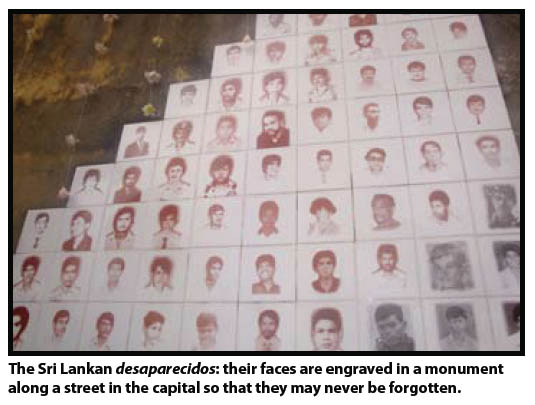 Among
the perpetrators against whom the COIs found credible material
indicative of their responsibility for the disappearances are names of
several leading politicians, high ranking officers in the police and
security forces, many of whom are still in service in higher positions.
Those who gave evidence of their involvement in the incidents concerned
are helpless spectators of these persons who are now in high positions
despite their misdoings.
Among
the perpetrators against whom the COIs found credible material
indicative of their responsibility for the disappearances are names of
several leading politicians, high ranking officers in the police and
security forces, many of whom are still in service in higher positions.
Those who gave evidence of their involvement in the incidents concerned
are helpless spectators of these persons who are now in high positions
despite their misdoings.
The President called for a special report from the Central Zone COI on
the killing of a candidate contesting a leading politician on the
request by the influential wife of the deceased. In compliance with this
request, the Commission did a thorough investigation and submitted a
special report. The passports of the security officers of this
politician, who were complicit in the killing, were impounded. Yet no
action was taken against this politician despite having enough evidence
of his involvement in the killing. Subsequently, the wife of the
deceased, who had complained to the COI and caused a special report to
be submitted, was made a Minister following which the Special Report was
swept under the carpet.
The COIs drew the attention of the government to the information on the
existence of about ten mass graves and several torture chambers in
various parts of the country. It was recommended that these be
investigated into, yet, successive governments did not take any action
with regard to this recommendation even though the location of these
places and the names of the persons who were responsible for them were
made available in the statements of the relevant witnesses who gave
evidence before the COIs.
Interim Report VII of the Central Zone COI refers to an officer in
charge of a police station in the North Western Province who was alleged
to have threatened a complainant and his family for having given
evidence against him before the COI. This matter was brought to the
notice of the President with a recommendation that this officer be
interdicted forthwith and disciplinary action taken against him. But
this recommendation was ignored. Subsequently, this police officer was
promoted to the level of an Assistant Superintendent of Police, despite
this case and his involvement in several disappearances in the area
where he served.
No disciplinary action against errant police officers
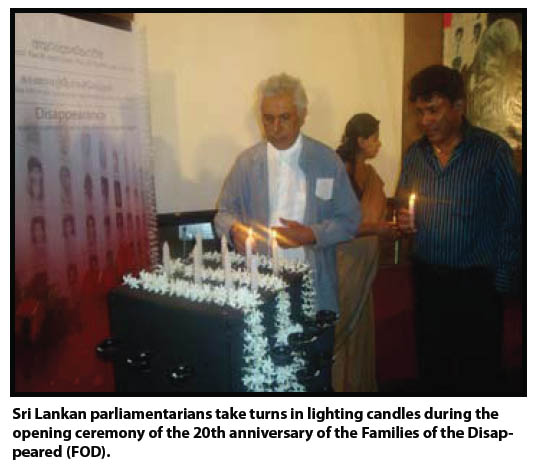 Though
it was recommended that disciplinary action be taken against all police
officers who were found by the Commissions to have violated departmental
rules and procedures, no such action had been taken against any of them.
Given below are some instances of such violations found by the COIs –
Though
it was recommended that disciplinary action be taken against all police
officers who were found by the Commissions to have violated departmental
rules and procedures, no such action had been taken against any of them.
Given below are some instances of such violations found by the COIs –
Sri Lankan parliamentarians take turns in lighting candles during the
opening ceremony of the 20th anniversary of the Families of the
Disappeared (FOD).
• In spite of a circular by the IGP directing that all
Information Books relating to the period of the COIs should be
preserved until the COIs had completed their task, it was found that
many Officers in Charge (OICs) had destroyed these books.
• Where complains of disappearances had been accepted by the
police, such complaints had been recorded in the Minor Offences
Register. This indicates that whoever recorded such a complaint
considered the disappearance of a person to be a ‘minor offence.’ Yet
no action has been taken against the officers concerned for this
serious lapse.
• There were instances where the list of detainees at a
police station on a given day, did not contain the names of some
individuals who had in fact been detained as was evident from such
names appearing in Diet Register for that particular day which was
maintained by another officer. This non-entering of the name of the
persons in the detainees register is indicative of the intention of
the OIC of that station. Many such persons had disappeared. Yet. no
action had been taken against such police officers.
• There had been evidence of female complainants having been
raped by police officers either at the police station when they came
to make complaints or at other places during search operations. No
action had been taken against any such officer even though evidence of
such instances had been recorded.
Miscellaneous
The copies of the Reports of the COIs that were printed and made public
by the Presidential Secretariat do not contain all the contents of the
reports that were handed to the President. While sections of the Reports
had been omitted in some reports, parts of the reports in others had
been completely left out. Thereby, some important information which the
original reports contained had not been made public.
The mandate of the All Island Commission on Disappearances was identical
to those of the Zonal Commissions except that it was authorized only to
inquire into the 10,136 complaints that had been received by the Zonal
Commissions and left un-inquired. In other words it was precluded from
inquiring into any new complaints. Yet while the Commission was
functioning, it received 12,000 new complaints of disappearances which
it was not authorized to inquire into. These complaints have been listed
and included in the Report of the COI with a recommendation that the
President should take action to inquire into them at a future date.
At the time the All Island Commission was appointed in 1998, Jaffna had
been regained from the LTTE and had come under government control. About
600 of the new complaints received by this Commission were in respect of
disappearances from the Jaffna District which occurred following the
takeover of Jaffna by the government. The Citizens Committee of
Batticaloa handed a list of 7,000 disappearances with a note that these
were not filed before the COIs appointed in 1994 as the persons who were
alleged to be responsible for the incidents were still in service at the
respective stations in the East. So the complainants were afraid to
complain against them at that time.
Of the 600 alleged to have disappeared from Jaffna, 341 complaints had
been filed at the National Human Rights Commission. This Commission
appointed a Committee to which it delegated its powers to inquire into
these 341 complaints. The Report of this Committee states that in an
overwhelming number of those cases, there was clear evidence that the
army in Jaffna had taken the persons concerned into custody and that
there is no evidence whatsoever as to what happened to them thereafter.
The National Human Rights Commission launched on a project to process
the 12,000 complaints left un-inquired by the All Island Commission and
to compile a computerized data base of all the information on the
disappearances that had been inquired into up to that date by the COIs.
Unfortunately, this project was aborted with the change of government
and the new set of members taking over the Human Rights Commission
by-passing the provisions of the 17th Amendment to the Constitution.
As stated earlier in this document, the role of the Attorney-General in
prosecuting disappearances cases was discussed by the COIs in their
reports and they have recommended the appointment of an Independent
Public Prosecutor with constitutional safeguards. This was cited by the
International Independent Group of Eminent Persons, who, too contended
that the Attorney General was not an independent person and should not
lead evidence at the COI appointed in 2007 to inquire into serious human
rights violations.
Conclusion
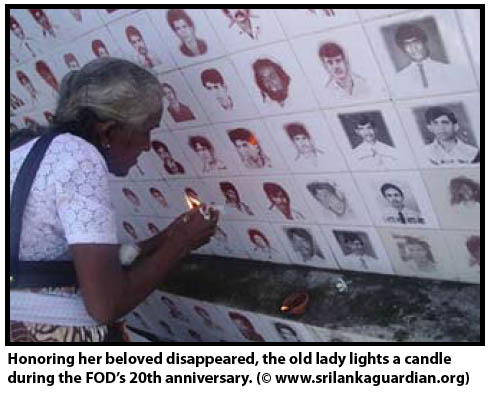 Successive
governments continued to ignore the recommendations of the Commissions
with regard to the perpetrators and the steps that need to be taken to
prevent the re-occurence of such incidents in the future. This promoted
the culture of impunity which pervades the police and security forces
personnel. It has been said in a lighter vein that the COIs have helped
the successive governments identify those in the police and army who
could be used to cause disappearances effectively. By this time, causing
the disappearance of a person had become a useful weapon in the hands of
whichever government that came to power. Even the current incidents of
disappearances could be perpetrated by such persons who have by now
become adept in the technique.
Successive
governments continued to ignore the recommendations of the Commissions
with regard to the perpetrators and the steps that need to be taken to
prevent the re-occurence of such incidents in the future. This promoted
the culture of impunity which pervades the police and security forces
personnel. It has been said in a lighter vein that the COIs have helped
the successive governments identify those in the police and army who
could be used to cause disappearances effectively. By this time, causing
the disappearance of a person had become a useful weapon in the hands of
whichever government that came to power. Even the current incidents of
disappearances could be perpetrated by such persons who have by now
become adept in the technique.
The three major parties in Sri Lanka -- the UNP, the SLFP and the JVP
are not interested in dealing with perpetrators of disappearances. They
have not pressed for the implementation of the recommendations of the
COIs in this regard perhaps because, at some time or the other, each of
these parties had used this weapon on those who had become thorns on
their backs. In these circumstances, the victims of disappearances who
are waiting for justice have no hope whatsoever of getting justice in
the near future.
1 The Central Zone Commission was for the disappearances
that occurred in the Central, Uva, North Central and North Western
Provinces while the other two Zonal Commissions were those for the
Northern and Eastern Provinces, and, or the Western, Southern and
Sabaragamuwa Provinces.

M.C.M. Iqbal is a retired senior civil servant of Sri Lanka who had been
Secretary to several Presidential Commissions of Inquiry, two of which
had been on disappearances of persons. Later he was a Consultant at the
National Human Rights Commission of Sri Lanka.